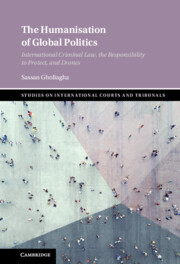6 results
2 - Diplomatic Protection
- from Part I - The Individual in the Law of the International Court of Justice
-
- Book:
- The Individual in the Law and Practice of the International Court of Justice
- Published online:
- 25 March 2025
- Print publication:
- 30 April 2025, pp 42-69
-
- Chapter
- Export citation
1 - The Humanisation of Global Politics
-
- Book:
- The Humanisation of Global Politics
- Published online:
- 25 August 2022
- Print publication:
- 01 September 2022, pp 1-20
-
- Chapter
- Export citation
8 - The Individual Human Being as a Theoretical Category
-
- Book:
- The Humanisation of Global Politics
- Published online:
- 25 August 2022
- Print publication:
- 01 September 2022, pp 203-218
-
- Chapter
- Export citation
2 - Humanisation in IR Theory and International Law
-
- Book:
- The Humanisation of Global Politics
- Published online:
- 25 August 2022
- Print publication:
- 01 September 2022, pp 21-48
-
- Chapter
- Export citation

The Humanisation of Global Politics
- International Criminal Law, the Responsibility to Protect, and Drones
-
- Published online:
- 25 August 2022
- Print publication:
- 01 September 2022
Chapter 11 - Animals
- from Part II - Anthropocene Themes
-
-
- Book:
- The Cambridge Companion to Literature and the Anthropocene
- Published online:
- 28 July 2021
- Print publication:
- 17 June 2021, pp 196-210
-
- Chapter
- Export citation

